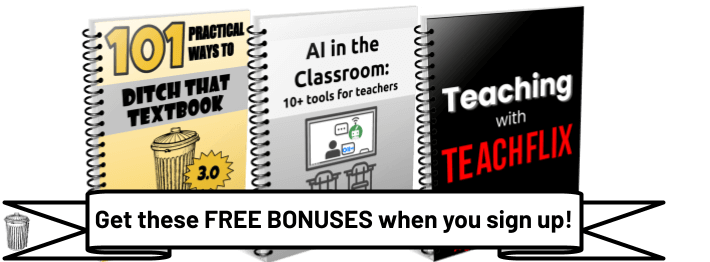Choose Your Own Adventure stories allow readers to pick the course of the story they read. The story changes based on the decisions that they make. These stories can be great fun for students as wrap-up activities to stories they’ve read (how does the story progress from here?) or simply as a creative writing activity.
Google Forms (available in Google Drive) provides a great format for creating Choose Your Own Adventure stories. This episode gives the basics on using Google Forms to create Choose Your Own Adventure stories. This Tech Tuesday screencast is brought to you by the Ditch That Textbook blog at www.ditchthattextbook.com.
Link to Google Drive: http://drive.google.com
(For notifications of new Ditch That Textbook content and helpful links, “like” Ditch That Textbook on Facebook and follow @jmattmiller on Twitter!)

Session expired
Please log in again. The login page will open in a new tab. After logging in you can close it and return to this page.
Great idea! I haven’t used Google Slides before but never ventured to forms.
Is there a way to allow fill in the blank responses or choices to follow as the story progresses? (e.g. on the first item/page have a text option for “What is your name?”)
Then use the name submitted here in further items (e.g. someone in the story uses the name later in the story).
Yes, but you’d need to use Sheets. Forms and Slides don’t support it.
I have two great applications for this, but the second one is massive.
(1) The classic no-ending story, “The Lady, or the Tiger?” has only two possible outcomes, but there are so many reasons why either one could actually happen.
(2) I have been toying with a decision map model for Shakespeare’s Julius Caesar that would explore all of the cascading consequences of different choices that could have been made by the various characters. The branching is formidable, and I wonder if it could be done without having some background tracking variables to keep track of prerequisites and cumulative effects. Can Google help with this, or would I have to step up to an Interactive Fiction programming language like Inform?
Thanks for the CYOA format. I used it to create a survey about whether my students were taking the AP test or not, with their original answer sending them to a “yes” or “no” page with additional questions.
Thanks a million!
Awesome! Way to go Kirsten!
Matt: Thanks for the idea!! Our county conducts “Google Slams” each month where we get 3 minutes to share a “cool tool” or idea for using Google Apps. I would like to share this in April and will definitely promote your blog with your permission. Please let me know. Thanks!
Great Idea, but what does the final product look like? Does it look like a form?
It does. It’s a form. When the reader is finished, he/she reads the end of the story and, after clicking the “submit” button, can view a graph of what endings other readers selected.
Great idea- use Google Forms, but I haven’t tried this before…. also haven’t experimented with the page breaks & linking the forms in sequential order…… will give it a try!
Thanks
Paula, you’re so brave to try new stuff, I should have guessed that I would get a comment like this from you! It’s pretty fun, but my students tended to get lost with all the different pages. Having a written plan really helped them out.